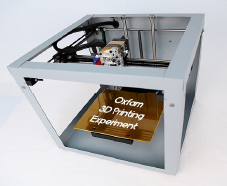Shaping the future: Our strategy for research and innovation in humanitarian response.

Shaping the future: Our strategy for research and innovation in humanitarian response.

With a goal of implementing 3D printing into Oxfam’s WASH (Water, Sanitation and Hygiene) Programme and, thereby, reducing the costs and improving the speed through which replacement parts can be provided in the field, a team lead by Professor Peter Tatham from Griffith University in Queensland, Australia, are piloting a project with Oxfam GB based from their Kenya offices.
We are all very excited as we have just kicked-off our project!! We’re enormously grateful to the Humanitarian Innovation Fund for their Grant, together with funding provided by both the University and two private organisations – RedR Australia and HK Logistics. Preparatory work is already underway and we are planning for the researcher to start on the ground towards the end of the year.
“What if you could print a replacement part yourself?”
We recognise that it is one thing for an expert to be able to use this emerging technology, but our aim is that, one day, Oxfam and other NGOs will have access to a database of 3-Dimensional CAD (Computer Aided Design) files that will cover many of the parts that are in their catalogue, from nuts and bolts to pipe connectors. If any of these parts need to be replaced, it would be as simple as selecting the relevant replacement item file and then customising it as necessary before printing the finished item. The whole process would take a matter of minutes or hours – rather than the days it currently takes to get a replacement from the UK warehouse. The potential time and costs savings from the use of 3D printing is one of the key reasons we are so excited to collaborate with Oxfam.

The project will start by mapping out a cohesive data collection and analysis process so we can compare our findings with those from the US-based Singularity University who are working on a similar project in Haiti.
Thereafter, we will be trialling the use of the 3DP system, with particular interest in the potential impact of environmental factors (heat, humidity, dust, power supply outages, etc), as well as really beginning to understand the sort of items for which 3DP is a good technique, and those for which it is less effective. Crucial to the project is our understanding of the training needs – the last thing we want is for the printer to be gathering dust in the corner after we have gone!!.
Throughout the project we will keep posting further information on our progress in this blog. If you would like further information, please feel free to contact the blogger [email protected]

 Please upgrade your browser
Please upgrade your browser
You are seeing this because you are using a browser that is not supported. The Elrha website is built using modern technology and standards. We recommend upgrading your browser with one of the following to properly view our website:
Windows MacPlease note that this is not an exhaustive list of browsers. We also do not intend to recommend a particular manufacturer's browser over another's; only to suggest upgrading to a browser version that is compliant with current standards to give you the best and most secure browsing experience.